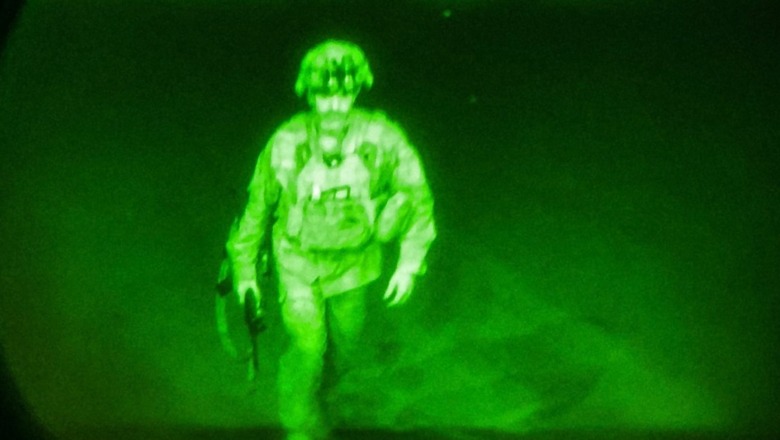
views
The commander of American military forces on the ground in Afghanistan and Washington’s ambassador there were the last to board the final evacuation flight from Kabul on Monday, the head of US Central Command said.
“On the last airplane out was General Chris Donahue, the commander of the 82nd Airborne Division, and my ground force commander there,” McKenzie told reporters at the Pentagon. “And he was accompanied by Ambassador Ross Wilson.”
McKenzie said they were the last on the ground at Kabul airport as the United States completed its military withdrawal from Afghanistan. “The State and Defense team were, in fact, the last people to step on the airplane,” the general said.
The last American soldier to leave Afghanistan: Maj. Gen. Chris Donahue, commanding general of the @82ndABNDiv, @18airbornecorps boards an @usairforce C-17 on August 30th, 2021, ending the U.S. mission in Kabul. pic.twitter.com/j5fPx4iv6a— Department of Defense ???????? (@DeptofDefense) August 30, 2021
A giant C-17 transport laden with troops and the US ambassador flew out of Kabul airport a minute before midnight local time on August 31, the deadline set by President Joe Biden. That brought to an end a helter-skelter airlift that evacuated more than 120,000 people fleeing the harsh rule of the Islamist Taliban, who seized power a fortnight earlier — two decades after US-led forces drove them from power.
The land that had brutally rebuffed the British empire and the Soviet Union delivered the same result to the modern world’s superpower. The distant war had plodded along in the background for most Americans.
But they were jolted back to it in the final days with the massive evacuation and the death of 13 US troops from an Islamic State suicide bomber who blew himself up at an airport gate.
The image of President Joe Biden attending a ceremony for their flag-draped caskets Sunday at the air force base in Dover, Delaware, could well be the lasting one of America’s war.
Five of the 13 were just 20 years old, meaning they were infants when Al-Qaeda, based in Afghanistan and protected by the Taliban, launched the September 11, 2001 attacks that sparked the conflict.
With great irony, the US exit depended heavily on trusting the Taliban to provide security around the airport against the Islamic State threat. “The Taliban have been very pragmatic and very businesslike,” said General Kenneth McKenzie, head of the US Central command.
The primary front of the “War on Terror” declared after the 9/11 attacks, Afghanistan became almost an afterthought as the administration of George W. Bush decided in 2003 to invade Iraq as well to oust then-leader Saddam Hussein. Rather than exit either after victory, the US took on nation-building tasks which it had not prepared for.
Meanwhile the US-backed government in Kabul proved corrupt and ineffective at consolidating its power and the Taliban persisted as a potent insurgency.
Afghan civilians and security forces have long taken the brunt of the failures, with tens of thousands killed and many more wounded.
But the costs to Washington were immense: 2,356 US military deaths, and an overall financial cost of $2.3 trillion, according to Brown University’s Watson Institute.
The end began under president Donald Trump, who came to office in 2016 promising to end the “Forever Wars.” After initially increasing troops to 16,000, with no lasting impact on the Taliban, he entered negotiations with the insurgents.
In a February 2020 agreement Washington committed to withdrawing by May 1 this year. The Taliban agreed to enter peace negotiations with Kabul, and to not attack American troops in the meantime.
But they then stepped up their campaign against Afghan government forces, who were immensely dependent on the United States.
By the time Biden replaced Trump on January 20, the official US troop presence was down to a bare-bones 2,500. He conducted a review and opted to proceed with the drawdown, though buying four months extra, to August 31, for what he hoped would be an orderly pullout.
Behind the scenes, he and his advisors concluded that the Afghans could not or would not wage the fight themselves. “We went to Afghanistan because of a horrific attack that happened 20 years ago. That cannot explain why we should remain there in 2021,” Biden said. “It’s time to end the forever war.”
Read all the Latest News, Breaking News and Assembly Elections Live Updates here.
















Comments
0 comment